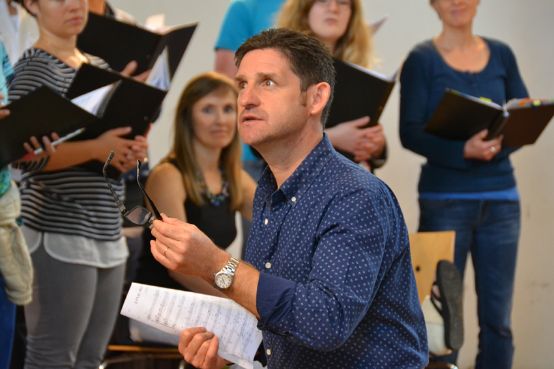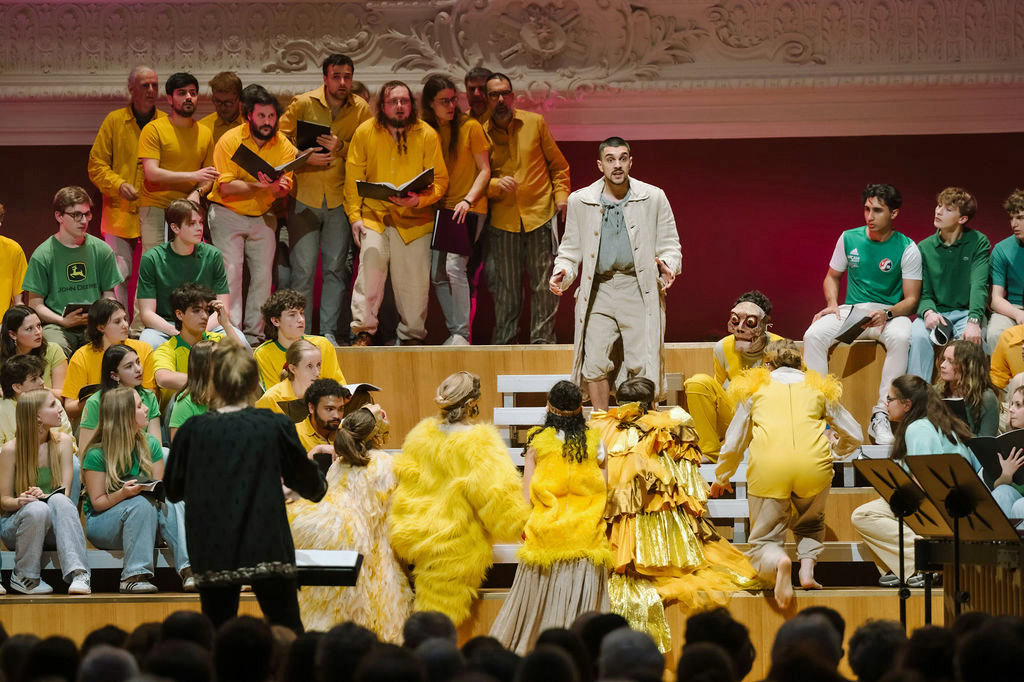Singers are actors
Paul Phoenix's choir master class at the Künstlerhaus Boswil is unique in Switzerland. It teaches choirs how to communicate among themselves and with the audience.

Paul Phoenix is a well-known British tenor. Until four years ago, he was a member of the King's Singers from Cambridge. The six singers of this vocal ensemble have not only toured all over the world, they have also won several Grammy Awards with their original crossover programs. Phoenix has made two guest appearances in Boswil with the famous ensemble. Since he stopped singing with the ensemble, he has concentrated on his teaching activities and even appears as a sought-after performance coach in China. He developed his choir master class four years ago especially for Boswil, preferring to call it Performance Coaching. At the same time, he founded Purple Vocals, a vocal coaching service that also offers online coaching via Skype: www.purplevocals.com
On the weekend of May 8-10, Phoenix was in Boswil for a master class for the fourth time. The chamber choir C21 under the direction of Michael Schraner and the vocal ensemble Cantemus under the direction of Judith Flury were given advice, an exciting learning process that led to an inspired final concert. "I think the Künstlerhaus, with its family atmosphere, is an ideal place for a choir course," says Phoenix in conversation, "here you can work together, eat together, spend time together, and you don't need any special instruments, it's actually quite simple, we sing together. That means: breathing together, paying attention to details, working dynamically."
Understand, tell, shine
The special thing about this master class is that it is not given by a choral conductor, but by a singer. What do you have to imagine under Performance Coaching imagine? Does that mean more show, smart clothes, special choir set-ups? Paul Phoenix is not interested in showmanship, as I discovered during a course visit on Saturday morning, he is interested in better communication with the audience. In most cases, everything happens between the choir members and the conductor, the audience is forgotten.
Judith Flury's vocal ensemble Cantemus will be performing an original Shakespeare-The choir is well prepared, this course is about the final, masterly polish. The English language is not easy to sing, especially the "th" must not become a "t". Three words is the name of a ballad by Juhani Komulainen: a very calm, tonally dazzling piece of music. "You sing it like a madrigal in church. I miss your passion," Phoenix intervenes, "do you understand what you're singing? This is a love song that oscillates between passion and resignation."
Phoenix reads the text aloud, recites it almost as if he were singing it, the three words are: I love you. And indeed, the 24 singers begin to tell the story. They detach themselves from the musical text, become freer, the soft choral sound gains meaning and contour. "Why are you all looking so serious?" says Phoenix in his likeable, humorous manner and grimaces. "Smile, your eyes must shine, feel good, have confidence!"
Speed, communication
It is very difficult to sing calm sounds in a choir without intuitively slowing down. "You lose tension that way, the expression becomes blurred. Make sure you stay in tempo." And lo and behold, despite the piano and flat sound, the singers are suddenly eagerly listened to. Phoenix then asks the conductor Flury to stand at the very back of the hall and conduct the choir from there. It works, they sing out into the hall with a clearly perceptible effect.
Not only the singers, but also the two conductors get some tips: "You usually stand with your back to the audience. Turn around, talk to the audience, greet them and say a few sentences about the pieces rather than writing program texts. That has a huge impact." And then the voicing: from a tuning fork and singing in front of the audience, or would you prefer to do it on the piano? Phoenix advises using a small harmonica or whistle, which is safer than singing and doesn't make you look bad.








